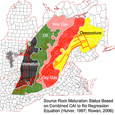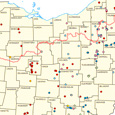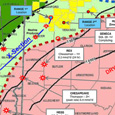Don’t ignore the letter in the mail: Call an attorney before signing
Wednesday, May 13, 2015

SALEM, Ohio — Oil and gas lease holders listen up: Don’t ignore the letter that comes in the mail from the oil and gas company that leases your mineral rights. It could mean a lost opportunity.
Some Ohio and Pennsylvania leaseholders, with leases from around 2008, have received letters from their natural gas lease holder, requesting permission to amend the royalty payment terms of their lease or other elements in their lease.
Attention
According to Penn State Extension Educator Dan Brockett, the letters are time sensitive and require immediate attention. If the company doesn’t hear from you with a “notice of non-consent,” then you will be considered to be in compliance with the changes the gas company is requesting. It is important to note that the changes being requested are generally for leases signed in 2008, but may not just be on leases prior to 2008. Simply put, some leases impacted could be newer or older.
Brockett said it is important to remember that the practices of shale energy development have changed considerably over time and so has a lot of the leasing language. He said some older leases may have pooling and unitization clauses that are smaller than what is typical now in shale drilling.
Another change that has impacted the shale industry is the horizontal drilling patterns extending from the well pad. A company no longer has to have a well pad on your property in order to extend a horizontal leg under your land. It could mean a gathering line may need constructed, though, tying it all together.
“Remember that each property is unique,” said Brockett.
Some of the elements leaseholders are being asked to consider changing are amendments in the date and frequency of payment and bigger unit sizes, among others. It could be as simple as a leasing company wanting to change how frequently the royalties are paid to something more complicated. For example, if the leasing company wants to amend the royalty terms, then it may be a good time for a leaseholder to suggest a surface use agreement or eliminating storage on the land included in the lease.
“It’s best to think of it as managing your lease and managing your land,” said Brockett.
Opportunity
Brockett suggests this may be an opportunity for the landowner as well as the oil and gas company.
“It’s an opportunity for change. It can be give and take,” said Brockett.
Brockett urges leaseholders to consider the letter a chance at a give-and-take situation. He said the lease amendments may be a reasonable request from the oil and gas company. However, he is quick to point out that no leaseholder should sign anything without an attorney’s assistance first. He urges lease owners to remember the oil and gas company will have an attorney review the language on their end, so a landowner should, as well.
He added that leaseholders need to recognize it is their land that is being impacted with drilling and it is up to the landowner to make sure that it is cared for like it should be. Brockett said the overall point of the letters being received is that landowners should re-read their lease, consider the change that has been proposed, and consider negotiating an exchange of amendments.
“It doesn’t hurt to ask — but the exchange may need to be approximately equal in scope (e.g. they want a small change, you ask for a small change that benefits you). In the end, the landowner can always reject the change requested,” said Brockett.




